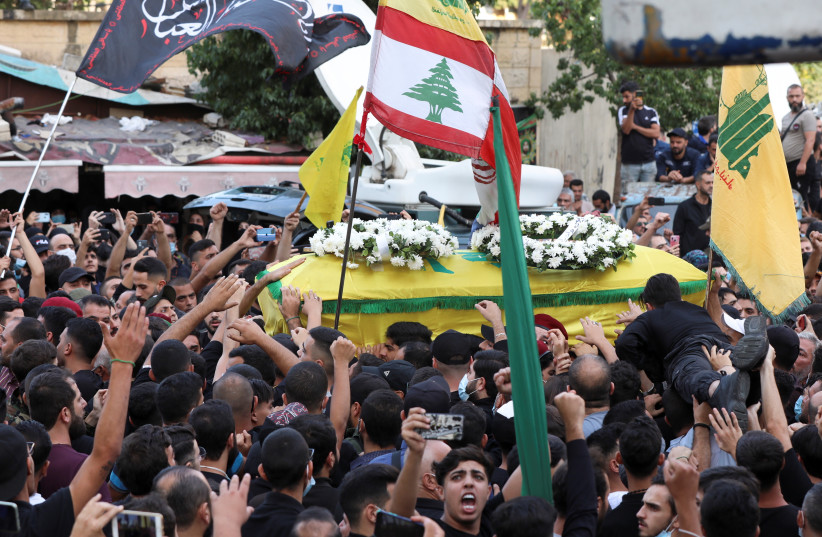A member of Hezbollah’s Executive Council slammed Israel this past week, claiming that tensions over Al-Aqsa Mosque will not go “unanswered.” The comments were printed in Iranian media that are close to the regime, indicating Tehran’s support for Hezbollah’s threats. They were made by Hassan al-Baghdadi, a US-designated terrorist who is a Hezbollah official.
According to the Fars News reports, Baghdadi claimed that Israel’s “attacks” on Muslim worshipers were a “clear violation of Muslim sanctities and feelings.” Al-Manar, the Hezbollah media channel, also reported the comments. The claim is that Hezbollah believes this aggression could not go unanswered.
The article in Iranian media does not provide more details of Hezbollah’s threats but does reference the upcoming elections in Lebanon.
The goal here is to try to use tensions with Israel to increase support for Hezbollah in Lebanon. This is because the terror group knows that recent comments by factions in Lebanon opposed to Hezbollah suggest they could perform well in upcoming elections.
The article also references other condemnations of Israel that have come from Amman.

Hezbollah has long wanted to channel wider regional anger about Israel into its specifically Iranian-backed messaging. This is because Tehran is not always able to fully piggy-back on the wider Palestinian movement. Iran seeks to use Palestinians against Israel and often uses Hezbollah as a proxy in these actions.
Hezbollah has claimed that Israel continues to “occupy” Lebanon, thus justifying Hezbollah’s “resistance.” Iran describes its various militias in Syria, Iraq, Lebanon and Yemen as an “axis of resistance.”
Hezbollah wants to use the last days of Ramadan to increase tensions with the Jewish state. It hopes that Iranian-backed groups like Palestinian Islamic Jihad will join it in increasing tensions.
Saudi Arabia’s ambassador to Lebanon recently hosted key Lebanese politicians for an iftar meal. According to The National news agency, “also present were former presidents Amin Gemayel and Michel Suleiman, former prime ministers Fouad Siniora and Tammam Salam... head of the Lebanese Forces party Samir Geagea, veteran Druze leader of the Progressive Socialist Party Walid Jumblatt, Kataeb Party chief Sami Gemayel and former MP Bahia Hariri.”
According to Al-Ain media in the UAE, a recent interview with Sami Gemayel included condemnation of Hezbollah. A member of the well-known Maronite Christian family that has long opposed Hezbollah, Gemayel believes upcoming elections could be “an opportunity to end Hezbollah’s dominance of power.”
In the interview with Al-Ain, he said that “there is an armed Lebanese party that has taken citizens hostage in their country, and the goal today is to restore the parliamentary majority and to stop Hezbollah’s hand from [being involved with] the legitimate state institutions.”
Gemayel said he is concerned that the Shi’ite Islamist political party is trying to make it impossible for the international community to know where Lebanon begins and Hezbollah ends. He says “our goal is to restore the possibility of differentiating between Lebanon and militias loyal to a foreign country.” Indeed, Hezbollah is loyal to Iran.
Hezbollah says that in the upcoming elections, scheduled for mid-May, “some people in Lebanon have declared their absolute allegiance to the devil and its mercenaries, and this has caused disgrace to Lebanese society.” It says that the “US-Israeli project” is involved in this conspiracy. Iran, and proxies like Hezbollah, have long compared Israel and the US to “Satan”; these comments are in line with this narrative.
The Hezbollah official Baghdadi “stressed that the economic blockade of Lebanon would not change the Lebanese view of the resistance he defended and supported, just as it would not oust the Israeli project,” noted Fars News.
Hezbollah also slammed the US and Saudi embassies in Lebanon for “their interference in the Lebanese elections.” As such, its goal now is to increase tensions with Israel and then to use this to increase its role in the elections. Hezbollah wants to portray opposition to it in Lebanon as tools of Israel, Saudi Arabia and the US.
